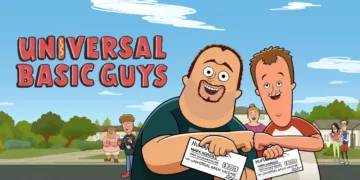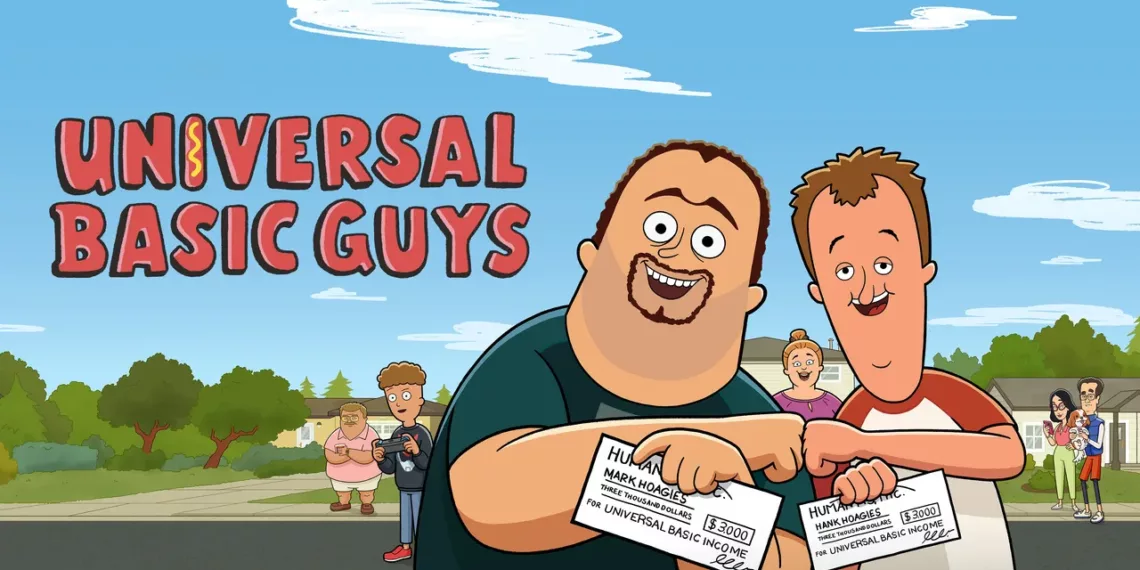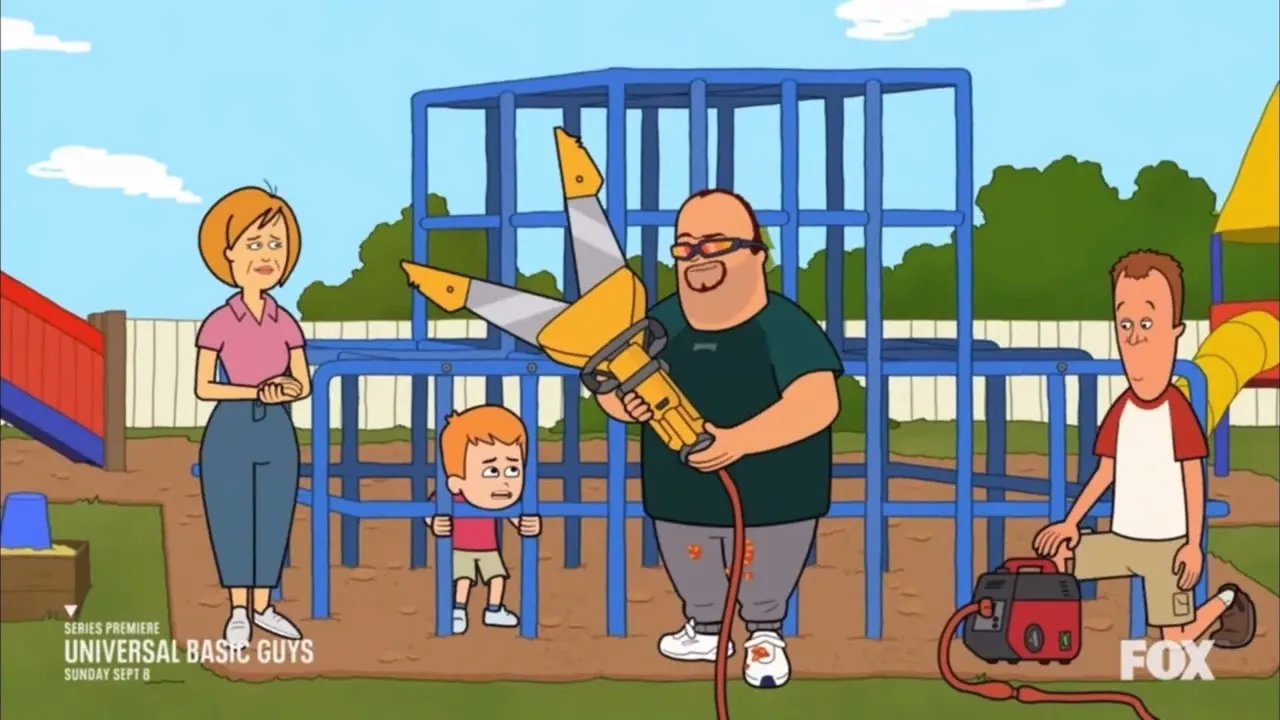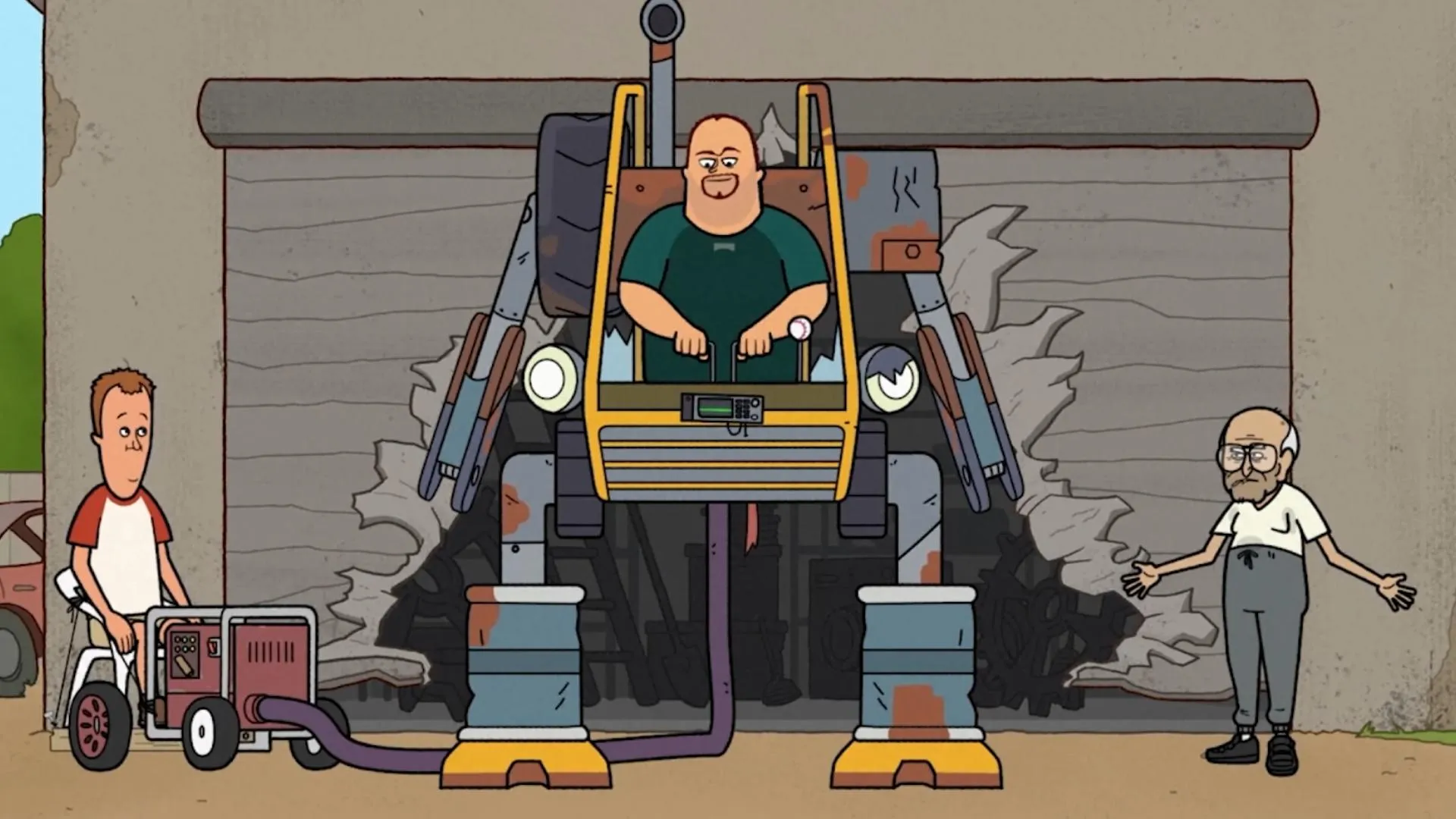Universal Basic Guys centers on the unexpected consequences of a hypothetical policy idea. The show follows brothers Mark and Hank Hoagies, who find themselves with a sudden surplus of free time after losing their jobs at a Jersey hot dog plant. Rather than unemployment stress, they’re offered $3,000 monthly as part of a basic income trial run by the state.
At first glance, this premise presents a lighthearted take on an idea with serious philosophical and economic implications. While basic income aims to alleviate poverty and boost local economies, here it mostly fuels sporadic adventures and purchases.
Comedy often derives from mishaps, so misusing funds makes sense for episodes. But by framing welfare as enabling aimlessness, the show risks endorsing unfair stereotypes. Its world also feels insular, featuring few voices beyond the brothers and their annoyed wives.
More could have been done to honor basic income’s goals of empowering communities and residents. Instead, this section finds the premise serves mainly as a vehicle for man-child laughs, casting a conservative shadow over a progressive policy debate.
Brothers on Basic
Universal Basic Guys centers on Mark and Hank Hoagies, brothers living in Jersey who find themselves unemployed after their hot dog plant replaces workers with robots. They receive a monthly stipend as part of a basic income pilot program.
In the first episode, “Pet Projects,” Mark wants to top the expensive spa gift his wife Tammy got from a coworker. He decides an exotic pet is the way to go and gets Hank to check out “Doc Tropix’s Sketchy Zoo.” They come home with a beat-up chimp, much to Tammy’s dismay.
The show establishes the brothers’ dynamic here. Mark is stubborn and reckless, while Hank goes along with his schemes. Tammy and the other wives generally react to their antics with frustration.
In “Sunset Cruise,” Mark and Hank go fishing, but Mark can’t resist showing up rival Steve. This leads to him hooking an enormous fish during Tammy’s dinner cruise karaoke. The fish causes chaos as Mark tries ditching it without her noticing.
Subsequent episodes see equally harebrained exploits, like Mark buying a cannon or sex doll. The plots feel loosely connected, with little character development beyond their initial roles.
Comedy happens in the moment rather than story arcs. While this lends anarchic energy, it leaves the central premise of basic income unexplored and the characters shallow. More thoughtful plotlines examining their changing relationships could have balanced the gags.
As is, the rapid-fire scenarios prioritize quick laughs over thoughtful narrative. This misses opportunities to sincerely engage with resonant themes of community and financial stability.
Simple Style, Missed Opportunities
Universal Basic Guys opts for a clean-lined animated look, rendered with loosely detailed character models. It employs a relatable style that matches the Everyman vibes of its leads.
However, the visuals lack flare. Scene compositions are functional rather than striking. Character emotions are expressed through basic poses and gestures rather than nuanced facial animation.
Some potential is shown in visual gags. The episode where Hank bonds with a chimp utilizes slapstick hijinks that land thanks to clear animation. Yet overall, the visuals are seldom daring or visually imaginative.
Considering the show takes place in Jersey, opportunities were missed to stylize settings and characterize locations. More distinctive visual flourishes could have brought the world to life and complemented story beats.
While fitting the down-to-earth brothers, a limited visual approach risks coming across as lacking effort or vision. The format afforded chances to enhance scenes through creative direction, composition, or artistry that went largely untapped.
With a bit more visual panache, Universal Basic Guys may have left a stronger impression alongside its animated peers on FOX. As is, its restrained presentation matches the fleeting nature of its narratives.
Missing the Mark
Universal Basic Guys aims to be a lighthearted comedy, prioritizing gags over deeper nuance. Its humor lands primarily in the slapstick misadventures of the hapless Hoagies brothers.
Many jokes rely on familiar tropes. Mark and Hank bumble into absurd scenarios, usually at the annoyance of their long-suffering wives. Their cartoonish missteps are played for quick chuckles.
Comedic timing in visual gags and physical comedy can be effective. Yet the show seldom takes risks, varying its approaches. Jokes also tend toward crass stereotypes that feel dated for modern audiences.
An episode revolving around failed TikTok challenges perfectly skewers fellow out-of-touch characters. However, most jokes shame male characters or make light of income assistance. Scant empathy is shown for struggling working communities.
Bright spots shine through supporting roles like Hank’s chimp bonding. Still, a majority of episodes leave little room for believable character relationships or meaningful commentary to elevate shallow premises.
With sharper writing honing in on its setting and subjects, Universal Basic Guys could find humor in relatable absurdity. As is, its lightweight approach works against developing true laughs that resonate.
A narrowed focus on punchlines risks coming across as lazy and alienating perspectives beyond a narrow spectrum. The show broadly misses comedic opportunities to engage its audience.
Surface-Level Sensibilities
With its premise of basic income, Universal Basic Guys touches on relevant themes of welfare programs, unemployment, and societal values. However, the show fails to genuinely engage with such real-world issues.
While moments address class divides between working wives and slacking husbands, gender stereotypes dominate. Programs are painted as subsidizing foolish male leisure rather than empowering communities.
Episodes could have dissected impacts of automation or job losses but ignored deeper explorations. Preferred gags stereotype the unemployed as lazy and promote harmful stigmas.
Comments on topics like masculinity ring hollow given the two-dimensional male characters. Satire is wasted when caricatures lack dimension beyond easy punchlines.
Even a storyline of sexist country clubs holds potential for nuanced social critique that’s squandered on clumsy jokes. Representations feel dated rather than insightful.
By prioritizing quick quips over thoughtful focus, the show superficially brushes themes for crass chuckles. It fails a chance to spark meaningful dialogue through resonant comedy.
Overall, lip service is paid to relevant issues while highlighting limitations in using progressive talking points only as shallow set dressing.
Surface-Level Stereotypes
With its ensemble vocal cast, Universal Basic Guys had potential to craft lively characters. Adam Malamut delivers Mark’s brash bravado, though his brother Hank stayed more reserved.
Fred Armisen brought some life as David, the neighborhood’s eccentric. Yet even sympathetic side figures got short shrift in plots, prioritizing gags over growth.
Tammy, Andrea, and other wives act primarily as exasperated foils. Rarely did episodes probe their perspectives or desires beyond frustration with “boyish” antics.
Comedic performances landed some jokes but failed to elevate shallow stereotypes. Opportunities were missed in developing wives and neighbors into truly round personalities.
Even a promising storyline of Hank bonding with a dying chimp declined, delving deeper into their connection. Emotional beats felt rushed alongside chaotic plots.
Talents like Malamut and Armisen showed flashes of charisma, yet character sketches stayed as two-dimensional as physical designs. Absent multi-episode arcs stunted potential for viewer investment.
More nuanced scripting, allowing space to flesh out the ensemble, could have balanced manic humor with heart. But characters essentially served one-note purposes from episode to episode.
Missed Chances for Meaningful Comedy
In conclusion, while Universal Basic Guys had the potential to offer funny insights, it ultimately falls short on multiple fronts. Concepts around basic income and social issues are reduced to superficial props rather than platforms to explore real human themes.
Some lively vocal performances and cartoonish hijinks provide moments of entertainment. However, the show’s undemanding approach does little to endear its characters or nourish lasting laughs.
By privileging disposable gags over character depth, plot continuity, or meaningful social commentary, opportunities are missed to craft a comedy with true rewatch value. Surface-level treatment of thought-provoking subjects likewise limits resonance.
With sharper writing embracing the heart of its worlds and inhabitants, Universal Basic Guys could have balanced lighthearted fun with poignant social musings. As is, it predominantly serves quick but fleeting gratification over thoughtful chuckles.
While not without flashes of potential, on the whole this program feels content delivering bare entertainment instead of boldly using comedy as a Trojan horse for richer ideas. A missed chance to leave lasting impact through a platform provoking both smiles and thoughts.
The Review
Universal Basic Guys
Universal Basic Guys displays glimpses of promise; it ultimately squanders opportunities for meaningful exploration and lasting humor by prioritizing superficial gags over character, plot, or commentary. A more balanced approach embracing both laughs and food for thought could have strengthened the show and resonated more successfully. However, as presented, its transitory pleasures generally disappoint.
PROS
- Premise touches on a thought-provoking policy concept
- Voice cast brings some energy to characters.
- Occasional jokes or visual gags land
CONS
- Shallow treatment of thought-provoking themes
- One-dimensional, non-evolving characters
- Plotlines lack continuity or deeper purpose.
- Reliance on transient, forgettable humor
- Fails to balance laughs with heart or commentary






















































Discussion about this post